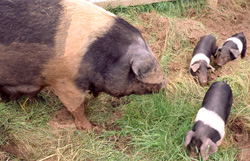Learn how to look after your pet with natural health treatments.
-
Study different natural approaches to animal health care, including - naturopathy, herbal treatments, tactile therapy, and homoeopathy.
This course is ideal for both animal owners and people who work with animals - from pet shop and animal shelter staff to farmers and animal attendants at wildlife parks.
COURSE STRUCTURE AND CONTENT
Course Duration: 100 hours.
Start Date: Start at any time - study at a pace that suits you, and with full tutor support for the duration of your studies.
Lessons: The Natural Animal Health Care course comprises 8 lessons as outlined, below.
Lesson 1. Introduction to Natural Animal Health Care
- Limitations of Conventional Medicine
- Holistic Treatments
- Homoeopathy
- Flower Essences
- Naturopathy
- Natural Nutrition
- Tactile Therapy (Massage, Equine Tactile Therapy, Bowen Therapy, Canine Myofunctional Therapy, Physiotherapy, Shiatsu, Reflexology, Osteopathy, Chiropractic, Acupuncture, Microcurrent, Microwave Therapies, Ayurvedic Medicine, Traditional Chinese Medicine)
- Benefits of Natural Health Care
- Codes of Practice for Animal Welfare
- Health and Safety in Veterinary Practice (Separating Animals, Infectious Diseases,
Containing Disease, Disposal of Dead/Infected Tissues, Dangerous non-Animal Wastes, Storage & Handling of Supplements/Equipment)
Lesson 2. Signs of Ill Health
- Normal Vital Signs
- Recognising Ill Health
- Disease Diagnosis
- Homoeopathic Remedies
- Signs of Shock
- Signs of Internal Bleeding
- Signs of Poisoning
- First Aid
Lesson 3. Natural Nutrition for Animals
- The effect of Modern Living on Domestic Animals
- Processed Pet Foods
- Affect of Poor Nutrition on Animal Behaviour
- Good Nutrition for Domesticated Animals (Carbohydrates, Protein, Fats/Lipids, Minerals, Vitamins, Supplements, Recipes)
- Nutritional Problems in Animals (Allergies, Dermatitis, Overweight, Underweight, Liver Disease), Livestock (Mineral supplements for farm animals, Nutritional Supplements)
Lesson 4. Holistic Health Care - Maintaining Health
- Creating a Healthy Environment (Domestic pets, Livestock)
- Health Maintenance
- Preventing Arthritis in Dogs
- The Vaccination Debate
- Pet Dental Care
- Flea Control
- Disease Prevention in Livestock
- Preventing Disease in Poultry
- Avian Influenza
Lesson 5. Holistic Health Care - Treating Health Problems
- Naturopathic Treatment
- Homeopathic Treatment
- Herbalism
- Treating Common Ailments (Arthritis, Skin Problems, Digestive Complaints, Diabetes, Dental Problems )
- Pain Management
- Identifying Pain
- Pain Relief Medication
- Herbal Treatments
- Homoeopathy
- Flower Essences
- Physical Therapy
- Equine Tactile Therapy
- Bowen Therapy
- Canine Myofunctional Therapy
- Behavioural Problems (Dogs - excessive barking, digging, aggression, phobias; Cats - urine spraying, scratching furniture, aggression; Birds)
Lesson 6. Animal Diseases & Health Problems (Domestic Animals)
- Dogs - Distemper, Heartworm, Parvo virus, Hydatid Disease
- Cats - Ringworm, Feline Aids - Feline Immunodeficiency Virus, Hairballs, Feline Herpes Virus or Cat Flu
- Rodents - Respiratory problems and Mycoplasma, Abscesses
- Reptiles - Mouth Rot or Canker (Stomatitis); cytoparasites (Mites); Pneumonia
- Fish, Cage Birds, etc.
Lesson 7. Animal Diseases & Health Problems (Livestock)

- Notifiable Diseases
- Control of Internal Parasites
- Horses (Tetanus, Lock Jaw, Strangles, Parasites, Colic, Equine Influenza)
- Cattle (Parasites, Mastitis)
- Pigs (Exudative Epidermitis of pigs (Greasy Pig), Leptospirosis, Parasites)
- Sheep (Enterotoxemia (Pulpy Kidney), Cutaneous Myiasis (Blow Fly strike)
- Poultry (Newcastle Disease (NCD), Yolk Sac Infection, Infectious Bronchitis (IB)
Lesson 8. Animal Health Care Case Study Research Project
- Symptoms of ill-health displayed by an animal
- Diagnosis of a problem
- Deciding on a natural course of treatment for a specific health problem
- Developing a management plan that an owner of the animal can undertake to help treat a problem and relieve associated pain and discomfort
Preventing Health Problems is Better than Responding after they Occur
Living in the modern world can negatively impact animal health, every bit as much as on human health. Pesticide residues, polluted air and impure foodstuffs can create problems with pets, farm animals and wildlife.
By-products from cities and factories such as smoke and traffic fumes can deplete vitamins A, E and C in large quantities. Sprays also deplete these vitamins as well as reducing zinc and magnesium levels. Anaemia is common in many animals despite iron being added to most foods. This is due to the fact that iron cannot be processed by the body without the presence of copper in the diet. Copper can be added to the diet simply by placing a piece of copper conduit in the animal’s drinking water.
Well-fed, psychologically content and properly exercised animals, have a healthy immune system which means they are better at fighting disease, are less prone to illness and should live a long and happy life.
Creating and maintaining a healthy environment in conjunction with providing a balanced and nutritious diet will always be a preferred way to maintain an animal’s wellbeing.
HOW THE COURSE WORKS
You can start the Natural Animal Health Care course at any time.
It is studied by distance learning, so you can study in the comfort of your own home. But this doesn't mean you are all alone in your studies. Our highly qualified and friendly tutors are there to help you every step of the way. If you have any questions at all, they are always happy to help.
Each lesson includes set tasks, and is completed with an assignment which the student submits to their course tutor. The tutor will mark the assignment and return this to the student with comments and suggestions for further reading.
WHAT DO ACS OFFER?
WHY STUDY NATURAL ANIMAL HEALTH CARE
LEARN MORE WITH ACS
We understand how important it is to choose the right course. If you have any questions please use our FREE COURSE COUNSELLING SERVICE to contact one of our animal health care tutors, they are always happy to help.